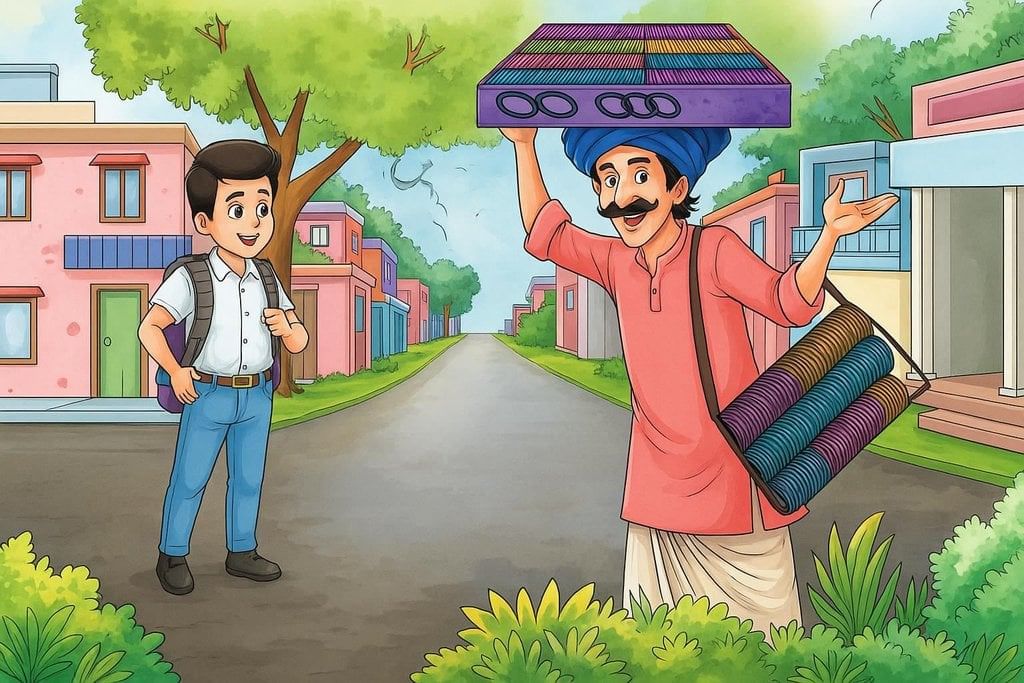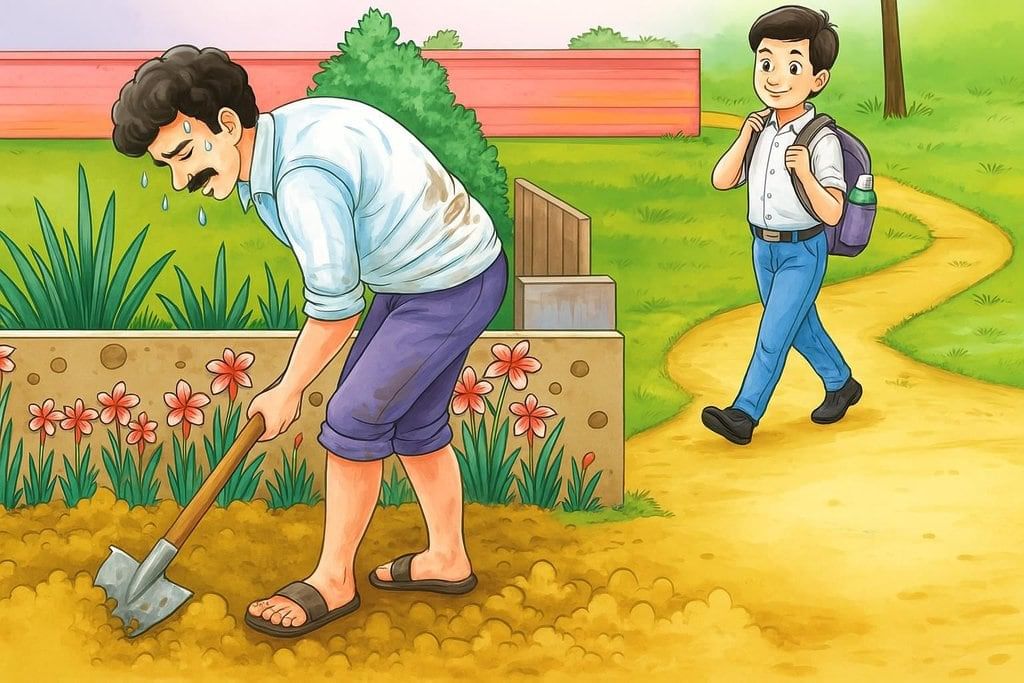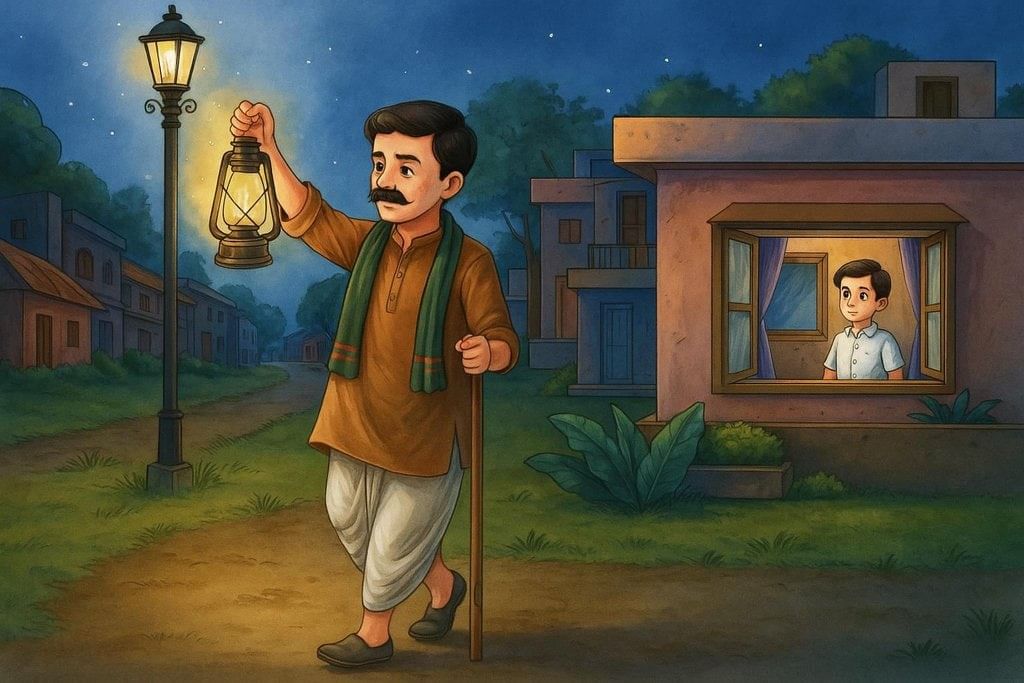Vocation Chapter Notes | English Santoor Class 5 - New NCERT PDF Download
| Table of contents |

|
| Introduction |

|
| Detailed Summary |

|
| Theme/ Message |

|
| Difficult Words |

|
Introduction
“Vocation” by Rabindranath Tagore is a heartfelt poem that reflects the innocent desires of a young child. As he goes through his daily routine, the child watches people like a hawker, a gardener, and a watchman and imagines their lives to be full of freedom and fun. The poem beautifully captures how children often wish to escape rules and responsibilities to live freely like the adults they admire. Through simple words and vivid images, Tagore shows us how the idea of freedom can look different through the eyes of a child. It also gently reminds us that every job has its role and value, even if it seems easy from far away.
Detailed Summary
First Stanza
When the gong sounds ten in the morning and
I walk to school by our lane,
Every day I meet the hawker crying, “Bangles,
crystal bangles!”
There is nothing to hurry him on, there is no
road he must take, no place he must go to, no
time when he must come home.
I wish I were a hawker, spending my day in
the road, crying, “Bangles, crystal bangles!”
In the morning at 10 o’clock, the child walks to school. On the way, he sees a hawker selling bangles. The hawker walks freely on the road, shouting “Bangles, crystal bangles!” He doesn’t have a fixed time or place to go. The child thinks the hawker is lucky because he is free and not rushed, like the child who must go to school. He wishes he could be a hawker too.

Second Stanza
When at four in the afternoon I come
back from the school.
I can see through the gate of that
house the gardener digging the ground.
He does what he likes with his spade,
he soils his clothes with dust, nobody
takes him to task if he gets baked in the
sun or gets wet.
I wish I were a gardener digging away
at the garden with nobody to stop me
from digging.
In the afternoon at four, when the child returns from school, he sees a gardener working in a garden. The gardener is digging the soil with a spade. He gets dusty and works under the hot sun, but no one stops or scolds him. The child feels the gardener is free to do what he likes. He wishes he could be a gardener, digging and playing in the mud without any rules.

Third Stanza
Just as it gets dark in the evening and my
mother sends me to bed,
I can see through my open window the
watchman walking up and down.
The lane is dark and lonely, and the
street-lamp stands like a giant with one red eye
in its head.
The watchman swings his lantern and walks
with his shadow at his side, and never once goes
to bed in his life.
I wish I were a watchman walking the streets
all night, chasing the shadows with my lantern.
At night, the child’s mother sends him to bed. Before sleeping, he sees a watchman outside walking up and down the dark street. The watchman carries a lantern and stays awake all night to keep the street safe. The child thinks the watchman is brave and free. He wishes he could be like him - walking in the dark, holding a lantern, and not having to sleep.

Theme/ Message
The poem shows how a child dreams of freedom. He sees different people like the hawker, gardener, and watchman and wishes to be like them because they seem free and happy.
It teaches that children often feel controlled by rules and wish to do what they want, just like the people they see around them.
The poem also reminds us that every job looks interesting from far away, but each one has its own hard work too.
It helps us understand that while it's fun to imagine other lives, we should also be thankful for what we have.
Difficult Words
- Hawker: A person who sells goods in the street.
- Lantern: A portable light source, often used at night.
- Spade: A tool used for digging in the ground.
- Chasing: To run after someone or something.
- Shadows: Dark shapes made when something blocks light.
|
40 videos|659 docs|63 tests
|
FAQs on Vocation Chapter Notes - English Santoor Class 5 - New NCERT
| 1. What is the meaning of vocation? |  |
| 2. How can someone discover their vocation? |  |
| 3. Why is it important to follow one's vocation? |  |
| 4. Can a vocation change over time? |  |
| 5. How can schools support students in finding their vocation? |  |














